Eat Well, Age Well

As we age, maintaining good health becomes increasingly important, and nutrition plays a vital role in promoting longevity and well-being. The right dietary choices can help manage chronic conditions, boost cognitive function, and enhance overall quality of life. Here are key nutritional strategies to support healthy aging. 1. Prioritize Protein for Muscle Health Muscle mass naturally declines with age, leading to reduced strength and increased risk of falls and fractures. To combat this, it’s crucial to consume sufficient protein as part of your nutrition for aging well. Incorporating lean sources of protein such as chicken, fish, eggs, legumes, and low-fat dairy into your diet helps preserve muscle mass and supports recovery after physical activity. For older adults, spreading protein intake evenly across meals may be particularly effective in maintaining muscle strength. 2. Embrace a Plant-Based Diet for Heart Health Heart disease is a leading cause of mortality among older adults. A plant-based diet rich in fruits, vegetables, whole grains, nuts, and seeds can significantly lower the risk of heart disease. These foods provide essential nutrients like fiber, antioxidants, and healthy fats that help reduce inflammation, lower blood pressure, and improve cholesterol levels. Additionally, plant-based diets are often lower in calories, which can help manage weight—a key factor in maintaining heart health. 3. Focus on Healthy Fats for Cognitive Function The brain is highly susceptible to oxidative stress, which can contribute to cognitive decline as we age. Consuming healthy fats, particularly omega-3 fatty acids found in fish, flaxseeds, and walnuts, supports brain health and promotes healthy aging. Omega-3s are known to reduce inflammation, protect against neurodegenerative diseases, and support cognitive function. Including fatty fish like salmon or mackerel in your diet twice a week is a simple way to boost your intake of these essential fats. 4. Prioritize Bone Health with Calcium and Vitamin D Bone density decreases with age, increasing the risk of osteoporosis and fractures. To maintain strong bones, it’s essential to consume adequate calcium and vitamin D. Dairy products, fortified plant-based milks, leafy greens, and tofu are excellent sources of calcium. Vitamin D, which aids calcium absorption, can be obtained from fatty fish, fortified foods, and sunlight exposure. For those who have difficulty meeting their needs through diet and sun exposure, supplements may be necessary. 5. Manage Weight with a Balanced Diet Maintaining a healthy weight is crucial for preventing a range of age-related conditions, including diabetes, heart disease, and joint issues. As metabolism slows down with age, it’s important to adjust portion sizes and choose nutrient-dense foods over empty calories. Incorporating plenty of vegetables, lean proteins, and whole grains can help manage weight while supporting healthy aging and ensuring you receive the essential nutrients needed for overall health. 6. Stay Hydrated for Optimal Health Dehydration is a common concern among older adults, as the sensation of thirst diminishes with age. Staying hydrated is vital for maintaining energy levels, supporting digestion, and preventing urinary tract infections. Aim to drink water regularly throughout the day and include hydrating foods like fruits and vegetables in your diet. Herbal teas and broths are also excellent choices for boosting fluid intake. 7. Support Digestive Health with Fiber Digestive health can decline with age, leading to issues such as constipation and diverticulitis. A diet high in fiber promotes regular bowel movements and supports a healthy gut microbiome. Incorporate a variety of fiber-rich foods such as whole grains, fruits, vegetables, and legumes into your diet. Fiber also helps regulate blood sugar levels and lowers cholesterol, further contributing to overall health. Healthy aging is closely linked to the foods we eat. By prioritizing a balanced diet rich in protein, healthy fats, fiber, vitamins, and minerals, older adults can enhance their quality of life, prevent chronic diseases, and support physical and cognitive function. Making mindful nutritional choices is a powerful way to age gracefully and maintain vitality well into the later years. For personalized meal suggestions tailored to your nutritional needs, visit the SaladStop! nutritional calculator today!
Howdy Salad: A Taste of the Wild West
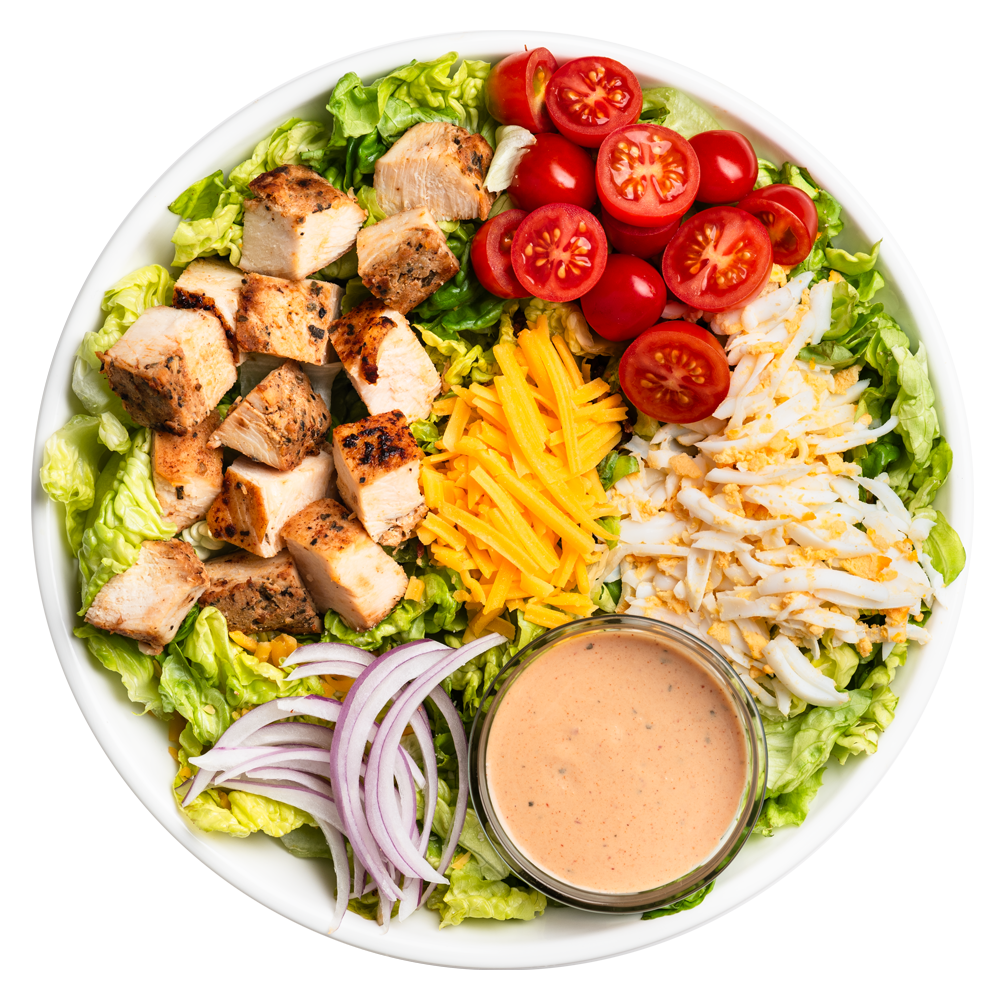
When you think of cowboys, you might envision rugged landscapes, wide-open plains, and hearty meals cooked over an open fire. SaladStop!’s Howdy Salad captures that spirit of the American West with a flavor-packed, satisfying dish that brings a touch of cowboy charm to your plate. This signature salad combines fresh ingredients with bold flavors, making it a perfect choice for those who crave something hearty yet wholesome. Let’s explore what makes the Howdy Salad a standout meal, worthy of its cowboy-inspired name. Crisp Romaine Lettuce: The Foundation of Freshness Just as a cowboy needs a reliable horse, a salad needs a sturdy base, and the Howdy Salad starts with crisp romaine lettuce. This leafy green is refreshing, crunchy, and packed with essential nutrients like vitamins A, C, and K. Romaine’s mild, sweet flavor complements the other ingredients, providing a sturdy base like a ranch’s strong foundation. It’s the bedrock of the Howdy Salad, providing a fresh, crunchy contrast to the richer, heartier elements. Roasted Chicken: The Protein Powerhouse A cowboy’s meal isn’t complete without a good source of protein, and the Howdy Salad delivers with its roasted chicken. We cook the chicken to perfection, delivering tender, juicy bites that are both flavorful and filling. Roasting the chicken enhances its natural flavors, making it the star of the salad, like a cowboy’s horse at the rodeo. Protein is essential for muscle repair and growth, making this salad an ideal option for anyone with an active lifestyle. It’s a hearty component that ensures you’ll stay fueled and ready for whatever the day brings. Cheddar Cheese: A Taste of the Old West No cowboy meal would be complete without a bit of cheese, and the Howdy Salad includes a generous helping of sharp cheddar. Cheddar cheese, with its tangy and robust flavor, brings a taste of the old West to this modern salad. It adds a creamy texture that perfectly complements the other ingredients while also providing calcium and vitamin D, essential for strong bones—just what you need for those long days on the trail. The cheddar’s richness adds a luxurious touch to the salad, echoing a cowboy’s well-earned meal after a hard day’s work. Grated Eggs: A Nutritious Classic Eggs have been a staple in cowboy cooking for generations, and the Howdy Salad honors this tradition with grated eggs. These eggs add a rich texture and high-quality protein, plus essential nutrients like choline for brain health. In the same way that eggs were a reliable source of nourishment for cowboys on the range, they provide a satisfying and nutritious element in the Howdy Salad, rounding out the meal with a touch of classic comfort. Cherry Tomatoes: A Burst of Freshness To balance the richer flavors, the Howdy Salad features cherry tomatoes, bringing a burst of juicy sweetness to the mix. These vibrant red gems are not only visually appealing but also packed with vitamins and antioxidants, including lycopene, which is known for its heart health benefits. In the wild West, fresh produce was a rare and treasured find, much like these cherry tomatoes are in the salad. They add a refreshing contrast that brightens the dish and keeps the flavors balanced. Red Onions: A Zesty Kick The Howdy Salad features red onions for a zesty kick, adding a touch of Western flair to the palate. Red onions are known for their sharp flavor and crunchy texture, which add a layer of complexity to the salad. They’re also rich in antioxidants and have anti-inflammatory properties, making them a healthy addition. The onions’ bold flavor is reminiscent of the boldness required to live the cowboy life—strong, vibrant, and never boring. Smoky Ranch Dressing: The Finishing Touch The Smoky Ranch dressing is the finishing touch that brings the Howdy Salad’s cowboy spirit to life. Furthermore, this creamy dressing, infused with smoky undertones, evokes the taste of a campfire meal enjoyed under the stars. Made with a blend of herbs and spices, the dressing ties all the ingredients together, adding depth and richness to each bite. It’s the perfect way to round out the salad, much like how a cowboy’s lasso pulls everything together in a rodeo. The Howdy Salad isn’t just a meal; it’s a culinary adventure that channels the rugged spirit of the American cowboy. From romaine lettuce to smoky ranch, each ingredient makes the salad hearty, flavorful, and satisfying. Whether you’re a fan of cowboy culture or just looking for a delicious and nourishing meal, the Howdy Salad is sure to hit the mark. So saddle up and dig in—you’re in for a taste of the wild West, right at your table. Try it here!
Feeding Your Mind Through Your Gut

The connection between gut health and mental health has emerged as a key area of interest in both nutrition and psychological sciences. The gut, often called the “second brain,” communicates with the central nervous system through the gut-brain axis, influencing mood, cognition, and overall mental well-being. Nutrition plays a crucial role in maintaining a healthy gut microbiome, which in turn, supports mental health. The Gut-Brain Axis: A Complex Communication Network The gut-brain axis is a bidirectional communication system that links the gastrointestinal tract with the brain. This system relies on a variety of pathways, including the vagus nerve, the immune system, and the release of neurotransmitters. The gut is home to trillions of microbes, collectively known as the gut microbiome, which play a significant role in this communication. The gut microbiome plays a crucial role in producing neurotransmitters like serotonin, commonly known as the “feel-good” hormone. In fact, the gut produces about 90% of the body’s serotonin. Additionally, the balance of gut bacteria affects the production of other neurotransmitters such as dopamine and gamma-aminobutyric acid (GABA), both of which are crucial for regulating mood and stress responses. The Role of Nutrition in Gut Health Nutrition is a critical factor in shaping the gut microbiome. The foods we eat provide the nutrients necessary for the growth and maintenance of gut bacteria, which in turn, influence mental health. Here’s how different dietary components affect gut health and, by extension, mental well-being: 1. Fiber-Rich Foods Dietary fiber, found in fruits, vegetables, legumes, and whole grains, serves as a prebiotic, which feeds beneficial gut bacteria. These bacteria ferment fiber to produce short-chain fatty acids (SCFAs) like butyrate, propionate, and acetate. SCFAs have anti-inflammatory properties and are crucial for maintaining the integrity of the gut lining. A healthy gut lining prevents the leakage of harmful substances into the bloodstream, which can trigger inflammation and negatively impact mental health. 2. Probiotics Probiotics are live bacteria that provide health benefits when consumed in adequate amounts. You can find them in fermented foods like yogurt, kefir, sauerkraut, and kimchi. Probiotics help to maintain a balanced gut microbiome by increasing the population of beneficial bacteria and reducing harmful ones. Some studies suggest that probiotics can reduce symptoms of anxiety and depression by modulating the gut-brain axis. 3. Omega-3 Fatty Acids Omega-3 fatty acids, found in fatty fish, flaxseeds, and walnuts, are known for their anti-inflammatory properties. These fats are essential for brain health and have been shown to improve mood and reduce symptoms of depression. Omega-3s also play a role in maintaining the structure of cell membranes in the brain, which is crucial for efficient communication between brain cells. 4. Polyphenols You can find polyphenols, plant compounds, in foods like berries, tea, coffee, and dark chocolate. These compounds have antioxidant properties and can support the growth of beneficial gut bacteria. By reducing oxidative stress and inflammation, polyphenols contribute to better mental health outcomes. 5. Sugar and Processed Foods Diets high in sugar and processed foods can have a detrimental effect on the gut microbiome. Moreover, these foods promote the growth of harmful bacteria, leading to an imbalance in the gut microbiome known as dysbiosis. Consequently, dysbiosis is associated with increased inflammation, which can negatively affect brain function and contribute to mood disorders like anxiety and depression. The Impact of Gut Health on Mental Health The gut microbiome influences mental health in several ways. First, the production of neurotransmitters like serotonin and GABA directly impacts mood regulation. Second, the gut’s immune function affects inflammation levels, which are linked to mental health disorders. Chronic inflammation, often resulting from an unhealthy gut, has been implicated in the development of depression and anxiety. Additionally, the gut microbiome plays a role in the body’s stress response. A balanced microbiome helps regulate the production of stress hormones like cortisol. An imbalanced microbiome, however, can lead to an exaggerated stress response, increasing the risk of mental health issues. Maintaining a healthy gut through proper nutrition is essential for supporting mental health. A diet rich in fiber, probiotics, omega-3 fatty acids, and polyphenols can promote a balanced gut microbiome, reducing inflammation and supporting the production of mood-regulating neurotransmitters. On the other hand, diets high in sugar and processed foods can disrupt the gut-brain axis, leading to mental health challenges. By making mindful food choices, we can nurture our gut health and, in turn, improve our mental well-being. For those seeking to make wise nutritional choices, they may opt to use SaladStop!’s nutritional calculator to create bowls tailored to their specific needs.
Eat to Heal with Anti-Inflammatory Foods
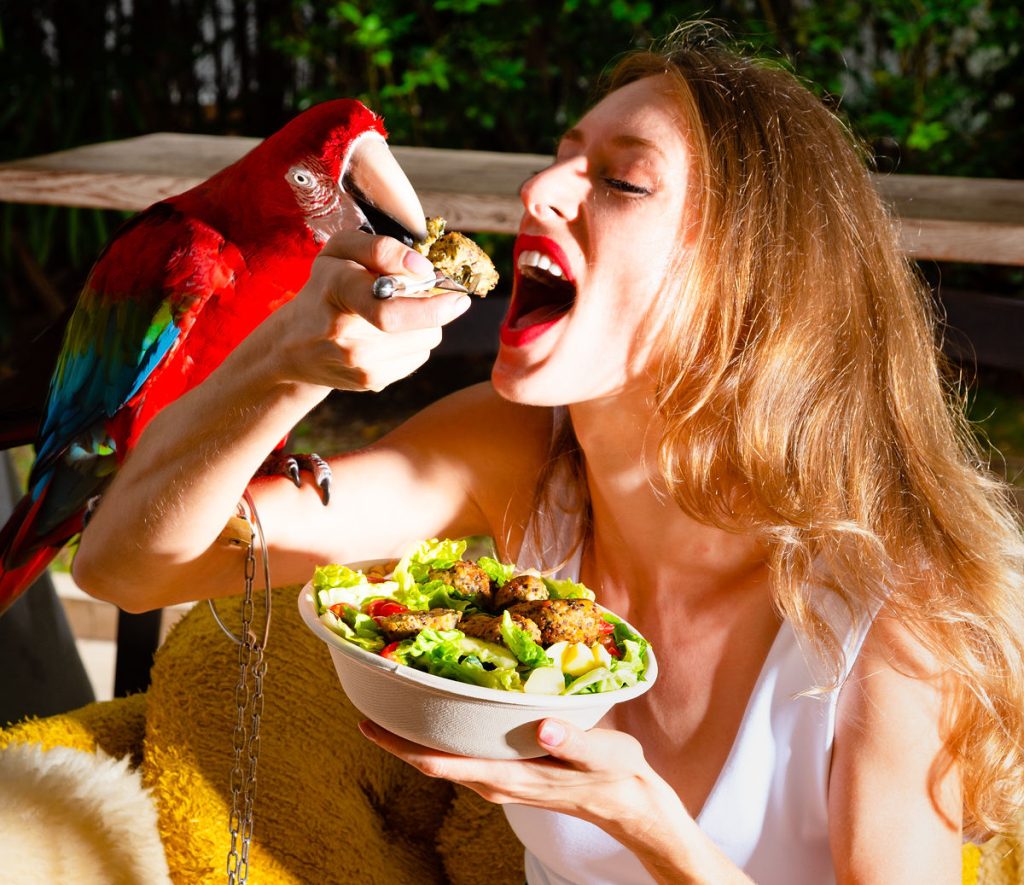
Inflammation is the body’s natural defense mechanism against injury, infection, or harmful stimuli. However, when inflammation becomes chronic, it can lead to serious health issues such as heart disease, diabetes, arthritis, and even cancer. To combat chronic inflammation, one of the most effective strategies is adopting an anti-inflammatory diet, which emphasizes foods that reduce inflammation while avoiding those that may trigger it. But what exactly does an anti-inflammatory diet look like, and how can you incorporate these principles into your daily meals? Let’s explore the key components of this diet and see how SaladStop!’s signature salads and warm protein bowls can be a convenient, delicious addition to your anti-inflammatory routine. Key Components of an Anti-Inflammatory Diet 1. Fruits and Vegetables: Nature’s Powerhouses SaladStop! makes it easy to include these anti-inflammatory foods in your diet. For example, the Iron ‘Wo’ Man signature salad is packed with nutrient-dense baby spinach, roasted pumpkin, baked mushroom, and toasted almonds, all of which help fight inflammation naturally. The addition of feta, pomegranate seeds, raisins, and a spiced berry vinaigrette not only enhances the flavor but also adds a boost of antioxidants to keep inflammation at bay. 2. Healthy Fats: Omega-3s to Combat Inflammation 3. Whole Grains: The Importance of Fiber The Seoul-ful warm protein bowl from SaladStop! is excellent for an anti-inflammatory diet. Its organic quinoa provides fiber to support gut health, while seared tuna offers omega-3s to reduce inflammation. Paired with mushrooms, tofu, a soft-boiled egg, and radish pickles, it’s a flavorful, inflammation-fighting meal with sesame seeds and Yuja Vinaigrette. 4. Spices and Herbs: Flavor with Benefits 5. Beverages: Hydration and Anti-Inflammatory Support What to Avoid on an Anti-Inflammatory Diet 1. Refined Carbohydrates and Sugars 2. Processed and Red Meats 3. Trans Fats 4. Excessive Alcohol 5. Artificial Additives Practical Tips for an Anti-Inflammatory Diet Adopting an anti-inflammatory diet doesn’t have to be complicated. By choosing whole, nutrient-dense foods and avoiding inflammatory triggers, you can significantly improve your health and reduce the risk of chronic diseases. Whether you’re enjoying a homemade meal or grabbing a quick lunch, SaladStop!’s selection of signature salads and warm protein bowls, like the Iron ‘Wo’ Man and Seoul-Ful, make it easy to stick to your anti-inflammatory goals while enjoying delicious, wholesome food. Discover these anti-inflammatory meals at SaladStop! – SaladStop! I Empowering a new generation of healthfulness
Balancing Hormones with Nutrition: A Guide to Harmonizing Your Health
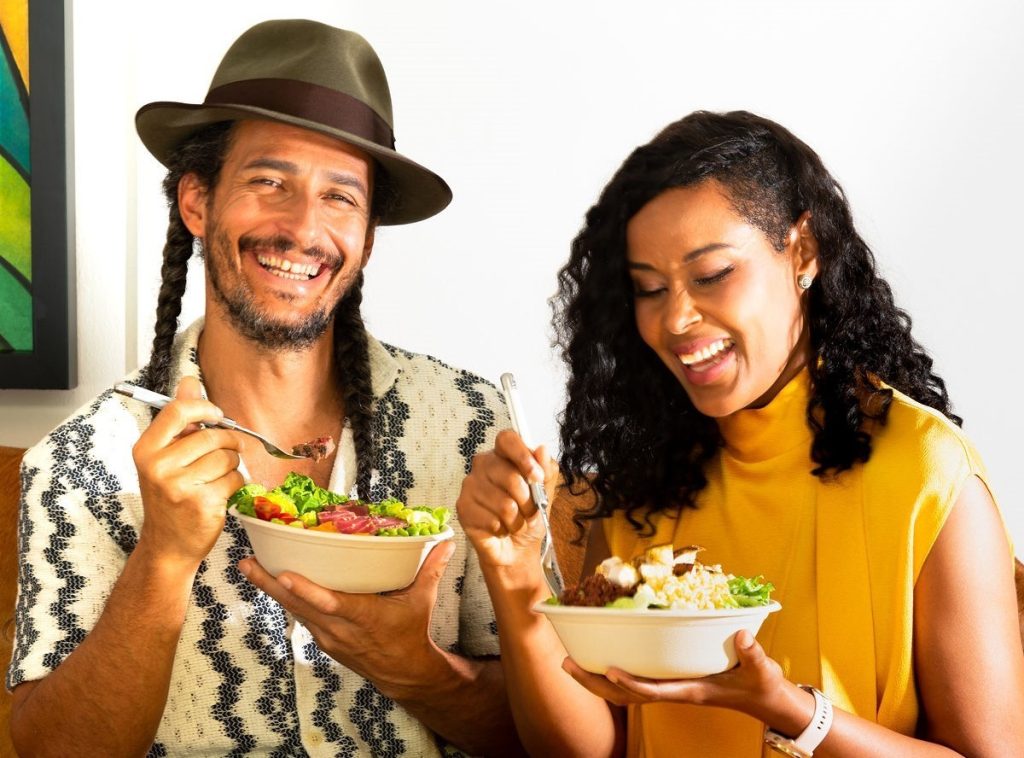
Hormones are the body’s messengers, playing a pivotal role in regulating everything from metabolism to mood. When these chemical messengers fall out of balance, it can lead to a cascade of issues—fatigue, weight gain, mood swings, and even chronic conditions. Fortunately, nutrition offers a powerful tool for helping balance your hormones naturally, especially for women who often struggle with maintaining adequate levels of progesterone. Understanding Hormonal Imbalance Hormonal imbalance occurs when there is too much or too little of a hormone in the bloodstream, impacting how we feel emotionally, how our bodies store fat, and more. Common symptoms include irregular menstrual cycles, unexplained weight changes, and sleep disturbances. These imbalances often stem from lifestyle factors, including diet. But here’s the good news: What you eat can either contribute to hormonal chaos or help restore equilibrium. By making informed choices, you can support your body’s natural hormone production and regulation processes. Nutrient Powerhouses for Hormonal Health 1. Healthy Fats Healthy fats, particularly omega-3 fatty acids, are vital for hormone production. They provide the building blocks for hormones and help reduce inflammation, which can exacerbate hormonal issues. For women, incorporating healthy fats is especially important for supporting progesterone levels, a hormone crucial for menstrual health and mood stability. Include sources like: 2. Fiber-Rich Foods Fiber plays a significant role in hormone balance by helping the body eliminate excess hormones and supporting a healthy gut microbiome, which is essential for hormone regulation. For women, a diet rich in fiber is particularly beneficial for maintaining healthy progesterone levels. Make sure to incorporate: 3. Protein Protein is essential for maintaining hormone balance because it provides amino acids that the body uses to produce hormones. Moreover, protein helps regulate hunger hormones like ghrelin, which can prevent overeating and support weight management. For women, getting enough high-quality protein is vital for supporting progesterone production. Prioritize: Foods to Avoid While incorporating nutrient-dense foods is crucial, it’s equally important to limit foods that can disrupt hormone balance. 1. Processed Foods Highly processed foods, often loaded with trans fats, sugars, and artificial additives, can interfere with hormone production and regulation. They can spike insulin levels, leading to imbalances that affect everything from your reproductive hormones to your stress hormones. 2. Sugars and Refined Carbs Excessive sugar intake causes spikes and crashes in blood sugar levels, which can lead to insulin resistance. Over time, this can disrupt the balance of several hormones, including insulin and cortisol. 3. Alcohol While an occasional glass of wine may not harm you, excessive alcohol consumption can interfere with the liver’s ability to metabolize hormones, particularly those related to reproductive health. It can also disrupt your sleep cycle, which is critical for maintaining hormonal balance. The Role of Lifestyle Nutrition is a powerful tool for balancing hormones, but it doesn’t work in isolation. Lifestyle factors like stress management, sleep, and exercise also play a critical role. 1. Stress Management Chronic stress elevates cortisol levels, which can lead to hormonal imbalances. For women, high cortisol levels can further deplete progesterone, leading to mood swings and menstrual irregularities. Incorporating stress-reducing practices like meditation, yoga, or deep breathing exercises can help lower cortisol levels and support overall hormonal health. 2. Quality Sleep Sleep is when your body does most of its hormonal regulation. Poor sleep disrupts this process and can lead to imbalances, particularly in stress hormones like cortisol and hunger hormones like ghrelin and leptin. Aim for 7-9 hours of quality sleep per night to support your body’s natural hormonal rhythms. 3. Regular Exercise Physical activity helps regulate insulin levels and reduces inflammation, both of which are critical for maintaining hormonal balance. However, it’s important to find a balance—too much exercise can increase cortisol levels, while too little can lead to insulin resistance and other issues. Balancing your hormones with nutrition is about making informed, consistent choices that support your body’s natural processes. By prioritizing healthy fats, fiber, and protein, while avoiding processed foods, sugars, and excessive alcohol, you can take significant steps toward achieving hormonal harmony. Complement these dietary changes with a balanced lifestyle, and you’ll be well on your way to a healthier, more balanced life. Remember, it’s not about perfection, but about making small, sustainable changes that promote long-term health. To help you make informed choices, explore SaladStop!’s nutritional calculator, which offers insights into the nutritional value of your favorite meals. By taking advantage of this tool, you can better tailor your diet to support your hormonal balance and overall well-being.
Hail Caesar Salad: A Classic with a Twist
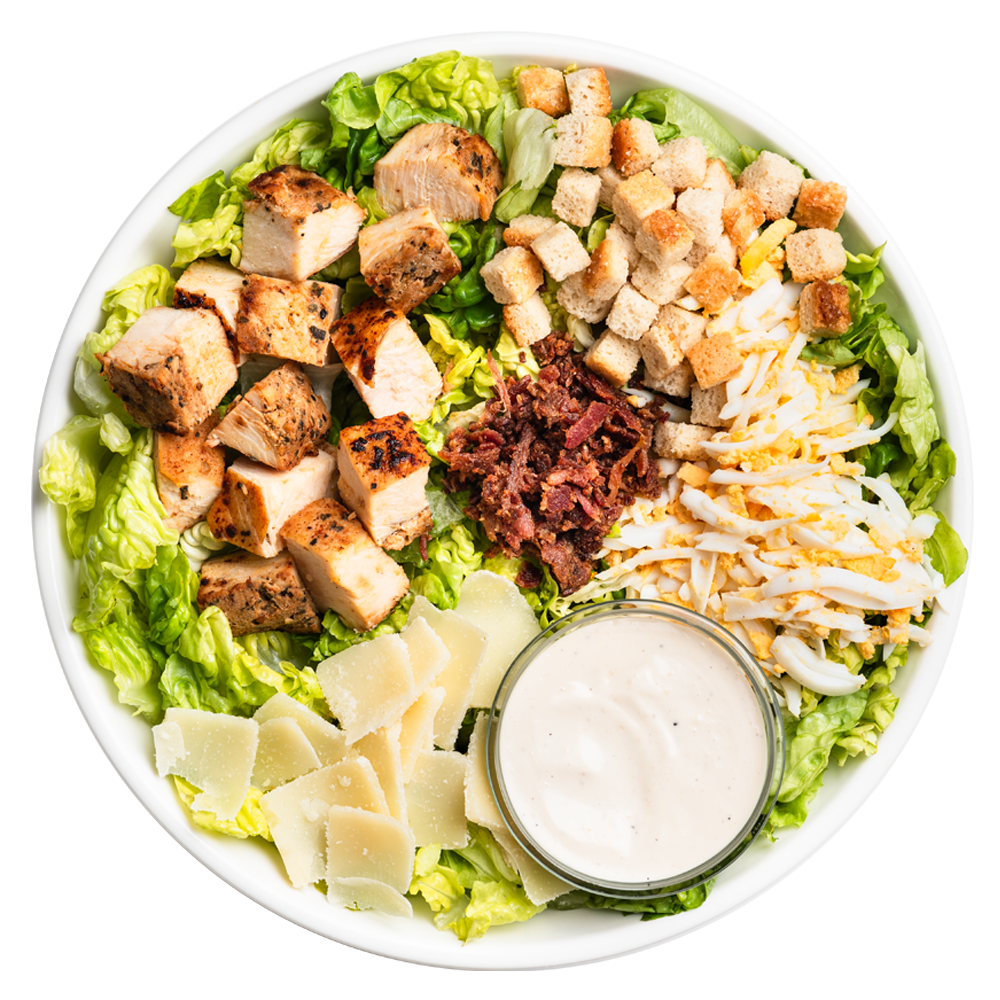
Our Hail Caesar Salad transforms the traditional Caesar into a culinary masterpiece designed to delight your taste buds and nourish your body. This inventive spin on a classic favorite blends fresh, high-quality ingredients with a creative touch, elevating your salad experience to new heights. Fresh Romaine for a Crisp Foundation A great Caesar salad starts with the perfect lettuce, and our Hail Caesar Salad features the freshest romaine available. Crisp and cool, each leaf is meticulously selected to ensure maximum quality and flavor. Rich in vitamins A and K, our romaine provides a nutritious base that pairs beautifully with the other ingredients. The satisfying crunch of the romaine sets the stage for a delightful and refreshing salad experience. Bacon Bits for a Savory Punch Our Hail Caesar Salad takes the savory element to the next level with perfectly crispy bacon bits. These bits are cooked to perfection, delivering a smoky, salty flavor that complements the freshness of the romaine. Each bite of bacon adds a delightful crunch and a protein boost, making the salad more filling and satisfying. The combination of textures and flavors creates a harmonious blend that keeps you coming back for more. Shaved Parmesan for a Rich, Nutty Flavor No Caesar salad is complete without Parmesan, and our Hail Caesar Salad features luxurious shaved Parmesan. The rich, nutty flavor of the Parmesan enhances the overall taste profile, while the thin shavings melt slightly upon contact with the romaine, creating a creamy texture. This cheese adds depth and essential nutrients, making each bite both delicious and nutritious. Grated Eggs for Extra Creaminess A standout feature of our Hail Caesar Salad is the inclusion of grated eggs, adding an unexpected twist to the traditional recipe. The finely grated eggs introduce an extra layer of creaminess and subtle richness that elevates the salad to new heights. Grated eggs blend perfectly, enhancing flavor and boosting protein for a more substantial and nourishing meal. This unique addition balances the crispness of the romaine and the crunchiness of the bacon bits, creating a perfect harmony of textures. Croutons for Crunch Our house-made croutons add another dimension of texture and flavor to the Hail Caesar Salad. Herb-seasoned and golden-brown croutons add a delightful crunch that contrasts with the creamy dressing and tender greens. Each bite of crouton bursts with flavor, making every mouthful a satisfying experience. The croutons add an extra layer of texture, ensuring that the salad is not only tasty but also engaging to eat. Classic Caesar Dressing for the Perfect Finish The crowning glory of our Hail Caesar Salad is our Classic Caesar dressing, crafted in-house with the finest ingredients. This dressing achieves the perfect balance of creamy and tangy, boasting a rich, luxurious texture that ties the whole salad together. Each drizzle of dressing enhances the flavors of the other ingredients, creating a cohesive and irresistible dish. It’s the dressing that truly sets our Hail Caesar Salad apart, making it a standout choice for any salad enthusiast. At SaladStop!, we believe that a salad should be more than just a meal; it should be an experience that excites your palate and nourishes your body. Our Hail Caesar Salad perfectly balances fresh, high-quality ingredients with innovative twists on a classic favorite. Our Hail Caesar Salad promises a delightful, wholesome experience, whether as a light lunch, satisfying dinner, or shareable side. Treat yourself to this exceptional salad and experience the freshness, flavor, and creativity that make SaladStop! your ultimate destination for extraordinary salads. Taste the difference with every bite and discover why our Hail Caesar Salad is a standout choice for salad enthusiasts everywhere.
Functional Foods for Immunity
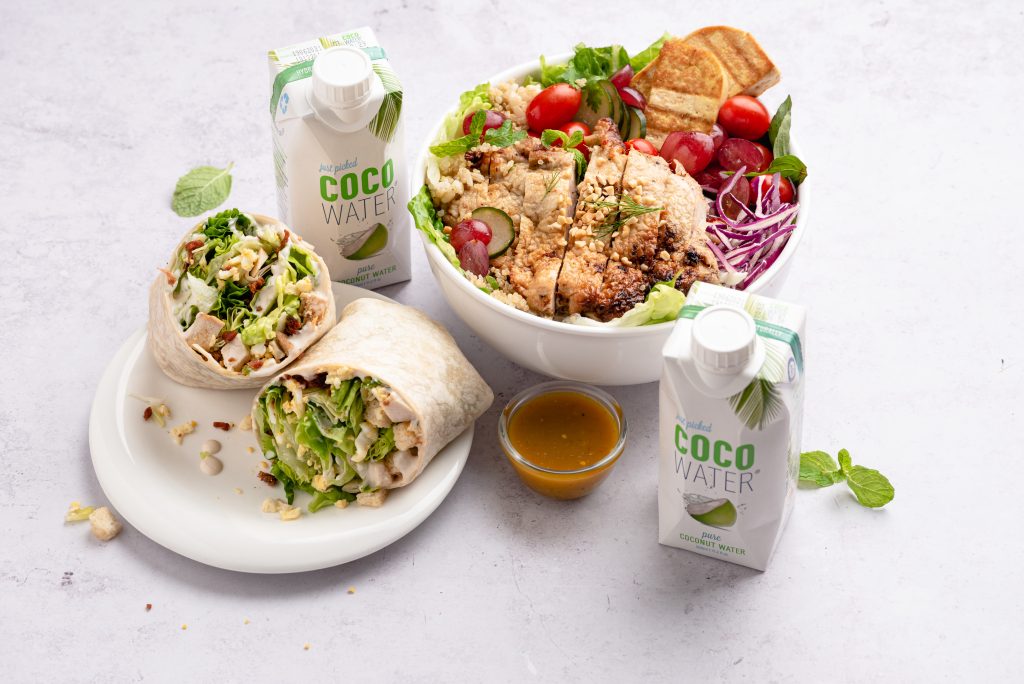
Boosting the immune system can be both effective and enjoyable by incorporating functional foods into the diet. These foods provide enhanced health benefits with vitamins, minerals, antioxidants, and other valuable compounds. Discover top functional foods that boost immune health and uncover their remarkable effects. Citrus Fruits Citrus fruits, such as oranges, grapefruits, lemons, and limes, are well-known for their high vitamin C content. Vitamin C is a powerful antioxidant that helps protect cells from damage and supports the production and function of white blood cells, which are crucial for fighting infections. Regular consumption of citrus fruits can help reduce the severity and duration of colds and other infections. Garlic Garlic, revered for centuries for its medicinal properties, contains compounds like allicin. These compounds enhance white blood cells’ ability to fight viruses such as those causing the common cold or flu. Adding garlic to your diet can help enhance your immune system’s ability to fight off these pathogens. Ginger Ginger is another potent functional food with immune-boosting properties. It has strong anti-inflammatory and antioxidant effects, which can help reduce inflammation and improve immune function. Ginger is also known for its ability to combat nausea, making it a great addition to your diet if you’re feeling under the weather. Yogurt Probiotics, or the “good” bacteria found in yogurt and other fermented foods, can give your immune system a boost by promoting the production of antibodies and enhancing the function of certain immune cells. Regular consumption of yogurt can help maintain a healthy gut microbiome, which is closely linked to overall immune health. Spinach Spinach is packed with numerous nutrients, including vitamin C, vitamin E, and beta-carotene, all of which have immune-boosting properties. These nutrients help protect cells from damage and play a role in the growth and function of immune cells. Additionally, spinach contains various antioxidants and bioactive compounds that help fight off infections. Almonds Almonds are a rich source of vitamin E, a powerful antioxidant that helps protect cells from oxidative stress and supports immune function. Just a handful of almonds can provide a significant portion of your daily vitamin E needs, making them a convenient and tasty way to enhance your immune system. Turmeric Turmeric contains curcumin, a compound with potent anti-inflammatory and antioxidant properties. Curcumin has been shown to modulate the immune system, enhancing the body’s ability to fight infections and reducing the risk of chronic inflammation. Adding turmeric to your diet, whether in curries, smoothies, or teas, can provide a substantial boost to your immune health. Green Tea Green tea is rich in antioxidants, particularly catechins, which have been shown to enhance immune function. Drinking green tea regularly can help protect against cellular damage and support the body’s natural defenses. Additionally, green tea contains amino acids that may aid in the production of germ-fighting compounds in your T-cells. Broccoli Broccoli is a superfood packed with vitamins A, C, and E, as well as fiber and numerous antioxidants. Its high nutrient content supports the immune system in various ways, from promoting the production and activity of white blood cells to protecting cells from damage. Including broccoli in your meals can provide a comprehensive boost to your immune defenses. Blueberries Blueberries are high in antioxidants, including flavonoids, which can help reduce oxidative stress and inflammation in the body. These compounds enhance the immune system by supporting the function of various immune cells and protecting them from damage. Eating blueberries regularly can contribute to a stronger and more resilient immune system. Incorporating Functional Foods into Your Diet Incorporating these functional foods into your diet doesn’t have to be difficult. Here are a few simple tips: Functional foods are a powerful tool in supporting and maintaining a healthy immune system. By incorporating these nutrient-dense foods into your daily routine, you can help ensure your body is well-equipped to fend off infections and stay healthy. Remember, a balanced diet combined with regular exercise, adequate sleep, and good hygiene practices is the key to optimal immune function. Stay well and enjoy the delicious journey to better health!
Discover the Benefits of a Sugar-Free Diet

In today’s world, where sugary treats seem to be around every corner, adopting a no sugar diet might sound like an extreme measure. However, the benefits of cutting out sugar from your diet extend far beyond just weight loss. From improved energy levels to better mood and enhanced overall health, going sugar-free can lead to a multitude of positive changes in your life. Understanding the No Sugar Diet Before delving into the benefits, it’s essential to understand what a no sugar diet entails. Simply put, it involves eliminating added sugars from your meals and snacks while focusing on whole, unprocessed foods. This means saying goodbye to sugary beverages, candies, pastries, and processed snacks that are laden with hidden sugars. Benefits of a No Sugar Diet 1. Weight Management One of the most apparent benefits of having a sugar-free diet is weight loss. Sugary foods and beverages are high in calories but offer little to no nutritional value. By eliminating these empty calories from your diet, you can create a calorie deficit, which is essential for shedding excess pounds. Moreover, sugar consumption is linked to increased belly fat, and reducing sugar intake can help trim your waistline and improve body composition. 2. Stable Energy Levels While sugar might provide a quick energy boost, it often leads to energy crashes shortly afterward. This rollercoaster effect can leave you feeling tired, irritable, and craving more sugar to regain energy. By switching to a no sugar diet, you can stabilize your blood sugar levels, leading to more consistent energy throughout the day. You’ll experience fewer energy dips and rely on more sustainable sources of fuel, such as complex carbohydrates and healthy fats. 3. Improved Mental Clarity Excessive sugar consumption has been linked to cognitive decline and impaired brain function. By practicing a sugar-free lifestyle, you can enhance mental clarity, focus, and concentration. Many people report experiencing heightened cognitive function and improved mood once they eliminate sugar from their diet. This clarity of mind can positively impact productivity, decision-making, and overall cognitive performance. 4. Enhanced Skin Health Sugar consumption has been associated with various skin issues, including acne, premature aging, and dullness. When you consume sugar, it can lead to inflammation in the body, which may manifest as skin problems. By eliminating sugar, you can reduce inflammation and promote clearer, healthier-looking skin. Additionally, a diet rich in whole foods provides essential nutrients and antioxidants that support skin health from within. 5. Better Heart Health Excessive sugar intake is linked to an increased risk of heart disease, including high blood pressure, elevated cholesterol levels, and insulin resistance. By adopting a no sugar diet, you can lower your risk factors for cardiovascular disease and improve heart health. Furthermore, reducing sugar consumption can lead to better blood sugar control, which is crucial for preventing diabetes and maintaining overall metabolic health. 6. Reduced Risk of Chronic Diseases A diet high in sugar has been implicated in the development of various chronic diseases, including type 2 diabetes, cancer, and Alzheimer’s disease. By cutting out sugar, you can lower your risk of these debilitating conditions and promote long-term health and longevity. Embracing a no sugar diet can help you take control of your health and reduce your susceptibility to chronic diseases. Tips for Success Transitioning to a no sugar diet may seem daunting at first, but with the right approach, it can be both achievable and enjoyable. Here are some tips to help you succeed: – Read food labels carefully and avoid products with added sugars. – Focus on whole, nutrient-dense foods such as fruits, vegetables, lean proteins, and whole grains. – Experiment with natural sweeteners such as stevia, monk fruit, or erythritol as alternatives to refined sugar. – Stay hydrated by drinking plenty of water throughout the day. – Plan and prepare your meals in advance to avoid succumbing to sugary temptations when hunger strikes. While cutting out sugar from your diet may require some effort and commitment, the benefits far outweigh the challenges. From weight loss and stable energy levels to improved mental clarity and better heart health, a no sugar diet can transform your health and well-being in profound ways. By making conscious choices to prioritize whole, nutrient-rich foods over sugary treats, you can embark on a journey toward a healthier, happier life. Interested in changing your perspective about sugars? Start here – SaladStop!’s 21 day No Sugar Challege!
SaladStop!’s Smoosha Smoothies
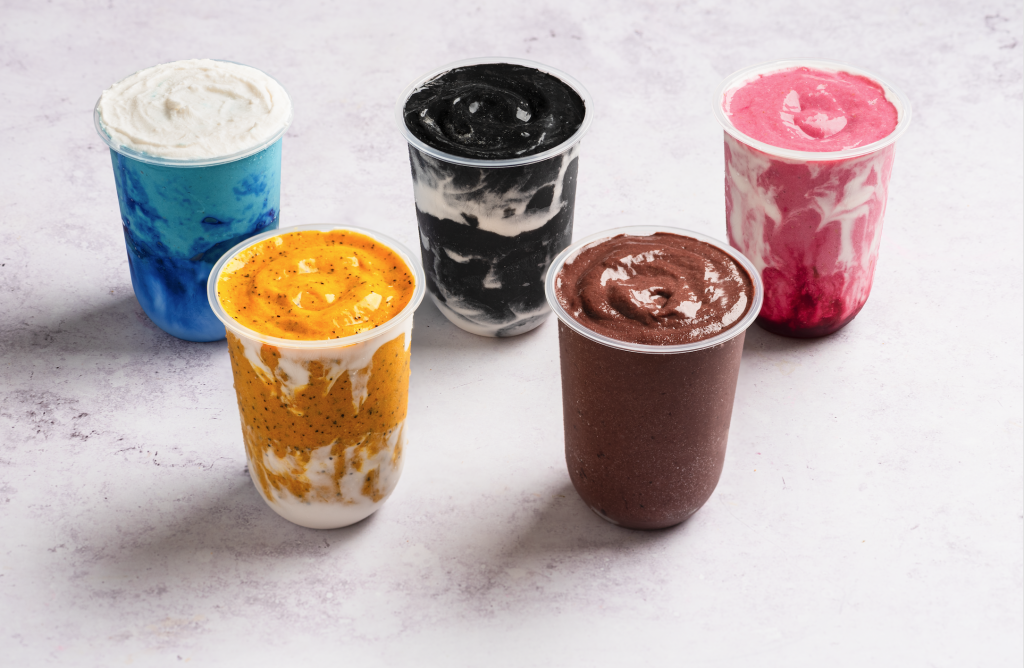
At the heart of SaladStop!’s Smoosha Smoothies lies the transformative power of nature’s bounty. Each smoothie is a harmonious blend of wholesome ingredients, carefully selected for their unique health benefits and rejuvenating properties. From antioxidant-rich fruits to nutrient-packed superfoods, every sip is a testament to the restorative potential of natural ingredients. These smoothies not only satisfy taste buds but also support overall health and wellness goals, offering essential nutrients in a delicious and convenient way. Boost immunity, energy, digestion, or skin health with delicious Smoosha Smoothies, incorporating essential nutrients into your daily routine. Each thoughtfully crafted smoothie delivers vitamins, minerals, and antioxidants, making it ideal for nourishing both body and mind. Cheaper than a Facial Treat yourself to a tropical oasis with the invigorating blend of pineapple, banana, mango, coconut mylk, coconut cream, blue spirulina, and collagen peptides. This smoothie not only tantalizes your taste buds but also nourishes your skin from within, offering a radiant glow that rivals the effects of a facial. Pineapple and mango are rich in vitamin C, promoting collagen production and skin health. Blue spirulina provides powerful antioxidants, while collagen peptides enhance skin elasticity and hydration. Power Shake Energize your day with the zesty fusion of mango, pineapple, passionfruit, lemon, carrot, coconut water, coconut cream, turmeric, and ginkgo biloba leaf. This revitalizing smoothie delivers a burst of essential vitamins and minerals, enhancing your vitality and resilience. Mango and pineapple are packed with immune-boosting vitamin C, while carrot provides beta-carotene for eye health. Turmeric’s anti-inflammatory properties and ginkgo biloba’s cognitive benefits make this smoothie a powerhouse of wellness. Detox Tonic Cleanse and rejuvenate your body with the detoxifying blend of blueberries, pineapple, lemon, avocado, medjool dates, coconut mylk, and activated charcoal. This refreshing elixir helps purify your system and restore balance, leaving you feeling refreshed and revitalized. Blueberries and lemon are rich in antioxidants, supporting liver function and detoxification. Avocado adds healthy fats and fiber, while activated charcoal binds toxins and promotes their elimination. Supreme Defense Strengthen your body’s defenses with the powerhouse combination of pure organic acai, banana, mango, oat mylk, and hyaluronic acid. This immune-boosting smoothie fortifies your body from within, promoting overall wellness and vitality. Acai berries are renowned for their high antioxidant content, while bananas and mango provide essential vitamins and minerals. Hyaluronic acid supports joint health and skin hydration, making this smoothie a comprehensive wellness booster. Energy Elixir Fuel your day with the dynamic fusion of banana, strawberry, blueberries, chia seeds, oat mylk, coconut cream, strawberry puree, vanilla, and maca root. This invigorating elixir elevates your energy levels and enhances your stamina, empowering you to conquer any challenge that comes your way. Bananas and strawberries are excellent sources of quick-releasing carbohydrates, while chia seeds provide sustained energy with their high fiber and omega-3 content. Maca root is known for its adaptogenic properties, helping to balance hormones and increase endurance. Elevate Your Wellness Routine Incorporating SaladStop!’s Smoosha Smoothies into your daily regimen offers a myriad of health benefits, including improved digestion, enhanced immunity, heightened energy levels, and glowing skin. Whether you’re kickstarting your morning or seeking a post-workout refuel, these smoothies serve as the perfect solution to your nutritional needs. As we navigate the complexities of modern living, prioritizing our health and well-being becomes paramount. SaladStop!’s Smoosha Smoothies serve as a testament to the transformative power of nourishing nutrition, offering a delectable fusion of flavor and functionality. Elevate your culinary experience and embark on a journey towards vitality and longevity with every revitalizing sip. Your body deserves nothing less than the best—treat yourself to the gift of wellness with SaladStop!’s Smoosha Smoothies today. Discover SaladStop!’s Smoosha smoothies now!
SaladStop!’s Smoosha Acai Bowls
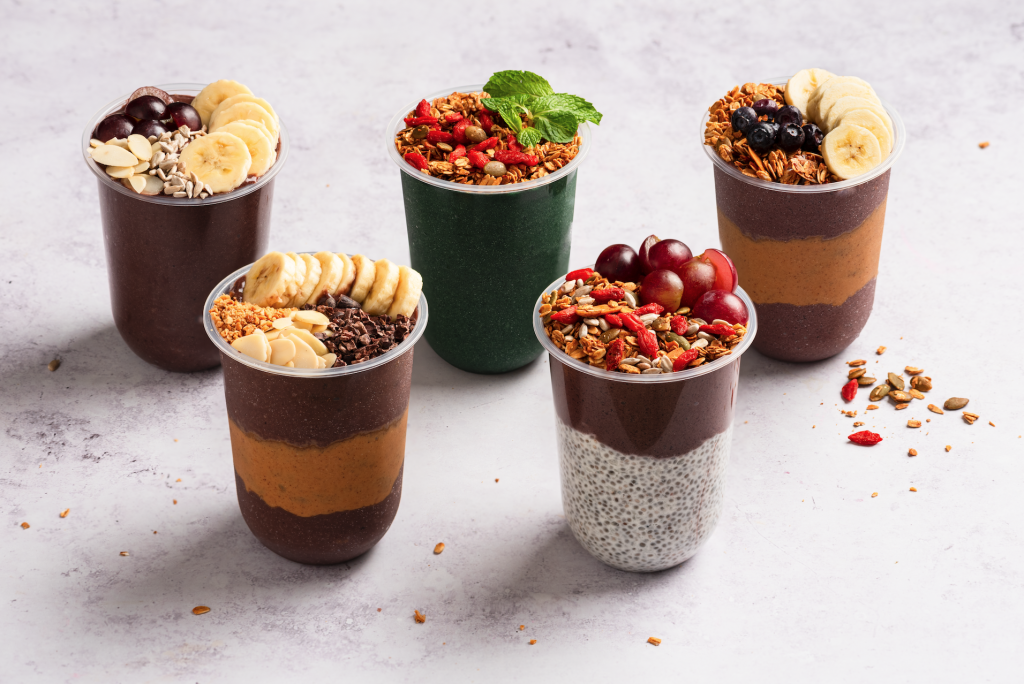
SaladStop! brings a fresh and exciting approach to healthy eating with its Smoosha Acai Bowls. These bowls blend nutrient-rich acai berries with wholesome toppings, offering a delicious, satisfying meal bursting with health benefits. The Power of Acai At the heart of the Smoosha Acai Bowls is the pure organic acai berry. Known for their high antioxidant content, acai berries help combat oxidative stress and inflammation in the body. Rich in fiber, these berries also aid in digestion and promote a healthy gut. Acai berries provide heart-healthy fats, essential amino acids, and micronutrients like vitamin A and calcium, making them dietary superstars. Acai Glory: A Nutrient-Dense Delight The Acai Glory bowl is a testament to the perfect blend of taste and health. This bowl combines banana, grapes, toasted almonds, sunflower seeds, and chia seeds for a delightful mix of textures and flavors. Bananas provide a natural sweetness and are rich in potassium, essential for maintaining proper heart and muscle function. Grapes provide juicy antioxidants and vitamins, while toasted almonds offer a satisfying crunch with healthy fats and protein. Sunflower seeds are a powerhouse of essential fatty acids and vitamin E, which support skin health. Chia seeds, a fantastic source of omega-3 fatty acids, fiber, and protein, complete this bowl, enhancing its nutritional profile. For added indulgence, a peanut butter drizzle brings creamy texture and healthy fats and protein to this nutritious bowl. Samba: A Berry Bliss The Samba Acai bowl brings together the natural sweetness of bananas and the antioxidant-rich goodness of blueberries. Blueberries, rich in vitamin C, K, and fiber, promote heart health and aid digestion with their nutritious profile. This bowl is further elevated with a sprinkle of granola, adding a delightful crunch and additional fiber. Chia seeds provide their usual benefits, and the peanut butter drizzle not only enhances the flavor but also adds a source of protein and healthy fats, making this bowl a balanced and satisfying meal. Triple G: A Superfood Symphony For those seeking a bowl with a twist, the Triple G acai bowl offers a unique combination of pure organic acai and coconut chia pudding. Grapes, granola, goji berries, and sunflower seeds top this bowl, creating a symphony of superfoods. Coconut chia pudding is rich in healthy fats and provides a creamy base that complements the tangy acai. Goji berries are a traditional superfood known for their high antioxidant content, which supports immune function and overall vitality. The combination of these ingredients ensures that the Triple G bowl is not only delicious but also packed with nutrients that support overall health and well-being. Green Glow: A Refreshing Vitality Boost The Green Glow acai bowl stands out with its vibrant green hue, thanks to the addition of organic spirulina. Spirulina is a nutrient-dense blue-green algae rich in protein, vitamins, and minerals, making it a powerful supplement for boosting energy and improving immune function. This bowl features frozen banana, granola, goji berries, chia seeds, and mint leaves. Mint adds a refreshing taste and aids in digestion, while the other ingredients provide a balanced mix of carbohydrates, proteins, and healthy fats. This bowl is perfect for those looking to start their day with a refreshing and energizing meal. Choco Nana: Indulgence with Benefits For those who crave a bit of indulgence without compromising on health, the Choco Nana acai bowl is an ideal choice. Pure organic acai is topped with banana, toasted almonds, biscoff crumbs, cacao nibs, and drizzled with cookie butter. Cacao nibs are a rich source of antioxidants and magnesium, promoting heart health and muscle function. The cookie butter drizzle adds a touch of decadence, making this bowl a deliciously satisfying treat that still offers significant nutritional benefits. SaladStop!’s Smoosha Acai Bowls are more than just a treat for the taste buds—they are a celebration of health and nutrition. Each bowl is thoughtfully crafted to provide a balanced mix of essential nutrients, antioxidants, and healthy fats, making them a perfect choice for anyone looking to enhance their diet with wholesome and delicious options. Whether you’re seeking an energizing breakfast, a post-workout refuel, or a healthy snack, these acai bowls are a delightful way to nourish your body and soul. So, next time you crave something deliciously healthy, dive into the vibrant world of SaladStop!’s Smoosha Acai Bowls. Your body will thank you. Discover SaladStop!’s Smoosha Acai Bowls now!

